If you're a frequent visitor to Healthify, why not share our site with a friend? Don't forget you can also browse Healthify without using your phone data.
Mindfulness
Key points about mindfulness
- Mindfulness is the practice of deliberately bringing your attention to something in the present moment.
- This could be your thoughts, feelings, bodily sensations, or something in the surrounding environment.
- Mindfulness means noticing these things without judging them to be good or bad.
- Mindfulness can mean practicing formally for a set amount of time or deliberately paying attention to things in your daily life.
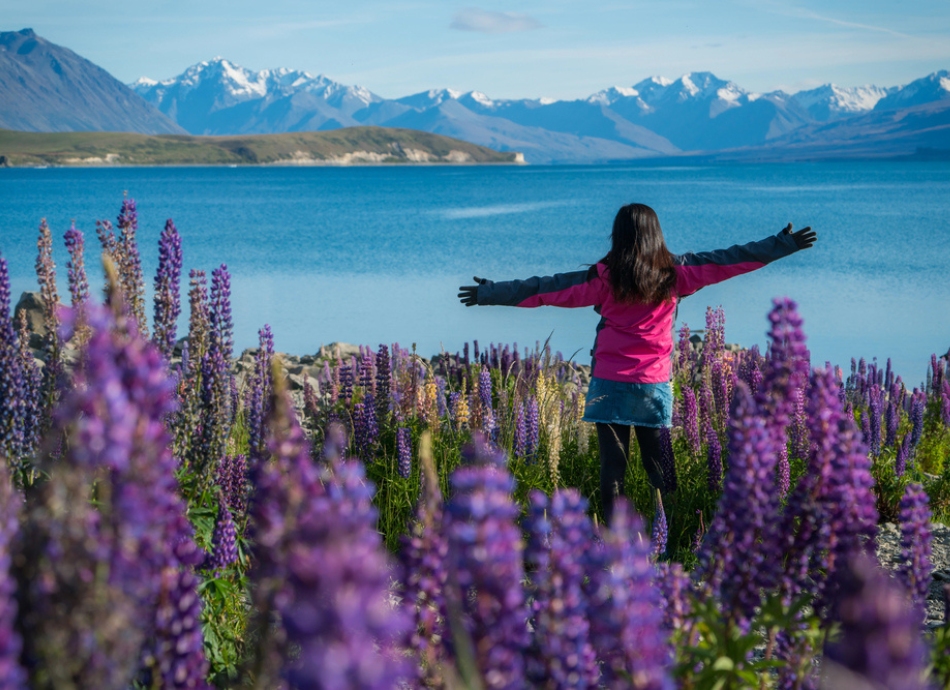
Video: An introduction to Mindfulness
This video may take a few moments to load.
(Mental Health Foundation, NZ, 2012)
Mindfulness involves becoming aware of your thoughts, feelings and body sensations as you experience them. As you become more aware of what’s going on for you, you get better at being able to meet your own needs. For example, you might become better at noticing when you need a break, when you are hungry or full, and when you are tired or need to get out for some exercise.
It also helps you notice other people. You might become more aware of other people’s impact on you or better at noticing other people's experiences, needs and emotions.
Because of this, mindfulness is great for helping reduce symptoms of stress, anxiety and depression. Even practicing mindfulness a little bit has been shown to be generally helpful, but the more often you practice, the more helpful it is.
Video: Mindfulness vs. Stress
This video may take a few moments to load.
(Dr Chantal Hofstee, 2016)
Video: Why Mindfulness Is a Superpower: An Animation
This video may take a few moments to load.
(Happify Inc, 2020)
For more videos and information on mindfulness for adults and children, go to our video page here.
Practising mindfulness, even a little bit, has been shown to improve symptoms of anxiety and depression, help with difficult emotions like stress, and improve concentration and memory. It may also help if COVID-19 related events are affecting your life.
- Slow down and bring your full attention to what you are doing.
- Breathe slowly and calmly while paying careful attention to each breath.
- Do one thing at a time.
- Take time to smell the roses – or look at the stars, stroll on a beach, stroke a pet.
- Write a journal or draw a picture, paying full attention as you do.
- Develop a daily mindfulness practice.
There are lots of ways to practice mindfulness. How mindful are you? Find out with the following mindfulness quiz.(external link)
Here is one exercise for you to try. Start with the first step and do as many of the steps in order as feel right for you. Practice every day, try for 5–10 minutes to begin with. You may wish to set a timer for the length of time you want to practice for so you don’t need to keep watching a clock.
It is important to remember that it is normal for our minds to drift off when we’re practicing mindfulness. An important part of mindfulness is the simple act of bringing our mind back to focus on the sensation we’ve chosen.
Exercise
- Find a quiet spot to sit in on your own.
- Become aware of your breathing. If you get distracted, just bring your focus back to the rhythm of your breath going in and out.
- After a few minutes, bring your awareness to your body. Scan your body from your feet up to the top of your head. Notice any body sensations, such as whether you are hot or cold, or any tension or itches.
- Bring your awareness to your feelings. Practice naming these feelings, not getting caught up in them.
- Bring your awareness to your thinking. Notice your thoughts then just let them go, without getting caught up in them.
- Sit quietly, holding in your awareness your breathing, your body sensations, your feelings and your mind. Enjoy this calmer and more spacious experience.
- Finally, if it is right for you, connect to your sense of God or the universe, and allow yourself to be held in this greater context.
If noticing what is happening in your body makes you feel distressed, don’t do this practice, but talk about it with your family doctor or therapist.
Videos with mindfulness techniques
Visit our page with videos including mauri tau (mindfulness), yoga, taonga puoro, mindful hikoi and connection to nature.
There is also a section for pre-school and school-age children to teach them simple mindfulness tools using breathing and visualisation.
When Aucklander Andrew Gardiner, 44, found out he had high blood pressure, he sprang into action. He changed his diet and started working out regularly in the gym. Even though he lost 40kg of weight, his blood pressure was still high, so following his doctor’s advice he started taking medication and when that didn’t work, he came across mindfulness.
“At the doctors when I first heard about mindfulness, and when I looked it up online, I thought, ‘that’s wishy-washy nonsense,” Andrew says.
But after his first mindfulness session, he noticed a change almost straight way.
“While you’re focusing on the breath, you’re focusing on nothing else – whatever concerns you had walking in, are cleared for that five minutes. Then over that next week, as it got closer & closer to Thursday again, I was looking forward to mindfulness!”
“Mindfulness has sorted out the blood pressure,” Andrew says. “For the last four or five months it’s been normal, and life’s pressures haven’t gone away."
"Certainly, the pressure at work is now more than it has been. I’m still exercising, I’ve still got the same reasonably healthy diet, so the only difference is mindfulness,” he says.
“In some respects, mindfulness makes you aware that you are under stress. I wasn’t aware of that before. I just didn’t notice it and it was affecting me because the blood pressure was reflecting that."
“But day-to-day I didn’t notice it. I think that being more aware of stress helps me to manage it. You know what’s going on. Sometimes, yeah, I have pushed myself away from the desk or pulled over, whatever it is, turned the phone off for five or 10 minutes, and practised mindfulness.”
“Try mindfulness. I do it all the time. Everybody could benefit from mindfulness. Even if you think everything’s hunky-dory. There’s something in it for everybody.”
There are a variety of audio guides and podcasts for breathing, meditation and mindfulness. Mindfulness is the practice of being aware of each moment of your day as it happens. Becoming more mindful helps reduce tension, stress and anxiety. It also helps you notice what supports your wellbeing.
| Organization | Resources |
| Centre for Clinical Interventions Australia (external link) |
Breathing retraining Attention retraining |
There are a variety of mobile phone apps for breathing, meditation and mindfulness. Mindfulness is the practice of being aware of each moment of your day as it happens. Becoming more mindful helps reduce tension, stress and anxiety. It also helps you notice what supports your wellbeing. Here are some apps to get you started.
|
Name |
Description |
|
Āio is a meditation app based on Māori teachings. The free version of the app comprises 6 basic videos. |
|
|
CALM - Computer Assisted Learning for the Mind |
Scientific studies on what makes people truly and genuinely happy show the importance of four main things:
This website, created by psychologists at the University of Auckland provides a range of resources, including audio files and meditation guides, to help you look at each of these four areas.
|
|
An app created by the Canadian organisation, the Anxiety Disorders Association of British Colombia, aims to help teens and young adults with anxiety, including panic, test anxiety, social anxiety, performance anxiety, perfectionism and worry.
|
|
|
An app created by the University of West of England aimed at people wanting to learn how to monitor and manage their anxiety.
|
|
|
A mindfulness and meditation app aimed at children, adolescents and adults who want to learn how to practice mindfulness and meditation.
|
|
|
|
A meditation app for all ages – adults and children.
|
There are a variety of online courses for breathing, meditation and mindfulness. Mindfulness is the practice of being aware of each moment of your day as it happens. Becoming more mindful helps reduce tension, stress and anxiety. It also helps you notice what supports your wellbeing. Here's one to get you started.
Introduction to mindfulness
- Cost: FREE
- Who will find this useful?
- People who are interested in learning about mindfulness and meditation
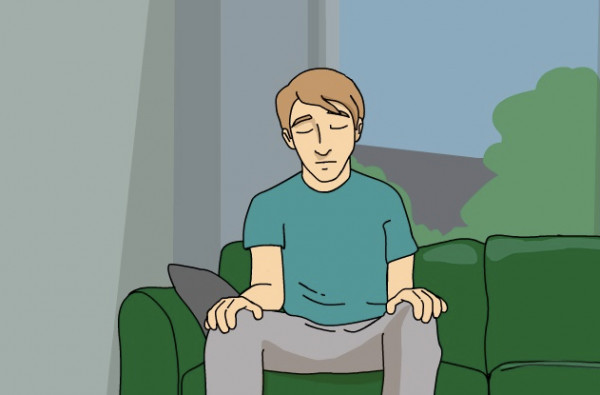 (external link)
(external link)
(THIS WAY UP, 2017)
Mindfulness for Wellbeing and Peak Performance
- Course hosted on Future Learn(external link)
- Cost: Fee applies
- Online course. 3 hours a week for 4 weeks.
- This course is for anyone, because everyone can benefit from mindfulness. No previous experience of mindfulness is required.
- The course will explain how mindfulness works, but above all this is a practical course. The course will ask you to explore different mindfulness techniques and reflect on your experience. This course is not designed to be therapeutic for significant health problems so if you have any concerns in this regard then it is recommended that you speak to a suitably qualified health practitioner.
What is mindfulness(external link) Mindfulness Education Group, NZ
Mindfulness for Mãori(external link) Mindful Aotearoa
Benefits of mindfulness(external link) Harvard Health, US
Mindfulness(external link) Mental Health Foundation, NZ
Resources
Te Kete Fatigue – relaxation [PDF, 53 KB] Healthify He Puna Waiora, NZ, 2022
Te Kete Fatigue – deep breathing [PDF, 61 KB] Healthify He Puna Waiora, NZ, 2022
Feeling good [PDF, 93 KB] Healthify He Puna Waiora, NZ
Emotional wellbeing [PDF, 112 KB] Healthify He Puna Waiora, NZ
What is mindfulness?(external link) Centre for Clinical Interventions, Australia
Mindfulness and letting go(external link) Centre for Clinical Interventions, Australia
Mindfulness in everyday life(external link) Black Dog Institute, Australia
Quiet the mind(external link) Matthew Johnstone, 2012
The alphabet of the human heart: The A–Zen of life(external link) Matthew Johnstone and James Kerr, 2009
Controlled breathing(external link) This Way Up, New South Wales Multicultural Health Communication Service, Australia.
Available in the following languages: English(external link), Arabic(external link), Chinese (simplified)(external link), Chinese (traditional)(external link), Filipino(external link), Greek(external link), Hindi(external link), Italian(external link), Korean(external link), Spanish(external link), Vietnamese(external link)
Progressive muscle relaxation(external link) This Way Up, New South Wales Multicultural Health Communication Service, Australia.
Available in the following languages: English(external link), Arabic(external link), Chinese (simplified)(external link), Chinese (traditional)(external link), Filipino(external link), Greek(external link), Hindi(external link), Italian(external link), Korean(external link), Spanish(external link), Vietnamese(external link)
References
- Mindfulness(external link) Mental Health Foundation, NZ
- What Are the Benefits of Mindfulness? A Practice Review of Psychotherapy-Related Research (pdf)(external link) Laboratory for Affective Neuroscience, University of Wisconsin, 2011
- Alterations in brain and immune function produced by mindfulness meditation(external link) Journal of Psychosomatic Medicine, 2003
- Mindfulness-based stress reduction and health benefits. A meta-analysis(external link) Freiburg Institute for Mindfulness Research, 2004
- Parsons CE, Crane C, Parsons LJ, Fjorback LO, Kuyken W. Home practice in Mindfulness-Based Cognitive Therapy and Mindfulness-Based Stress Reduction: A systematic review and meta-analysis of participants' mindfulness practice and its association with outcomes(external link). Behav Res Ther. 2017 Aug;95:29-41
Mindfulness in clinical practice
- Recommend mindfulness practices to patients affected by stress, anxiety and depression.
- Body-connecting mindfulness is contra-indicated in patients with psychosis and unprocessed trauma, including childhood sexual abuse.
- Evidence-based mindfulness therapies include:
- Mindfulness-based Stress Reduction (MSBR)
- Acceptance and Commitment Therapy (ACT), suitable for general patients
- Mindfulness-based Cognitive Therapy (MBCT), particularly useful for patients with depression
- Dialectical Behavioural Therapy (DBT), developed for use with patients with borderline personality disorder.
Research
Howarth A, Smith JG, Perkins-Porras L, Ussher M. Effects of brief mindfulness-based interventions on health-related outcomes: a systematic review(external link) Mindfulness. 2019;10(1957).
Courses
Online mindfulness-based stress reduction (MBSR) classes(external link) Mindful Living Programs
Guide to mindfulness-based cognitive therapy – professional training(external link) MBCT.com
DBT training calendar(external link) Dialectical Behaviour Therapy consultation and training, NZ
Mindfulness resources
- Guided meditations to complete with a patient in a 15–30 min session(external link) University of Auckland, NZ
Brochures
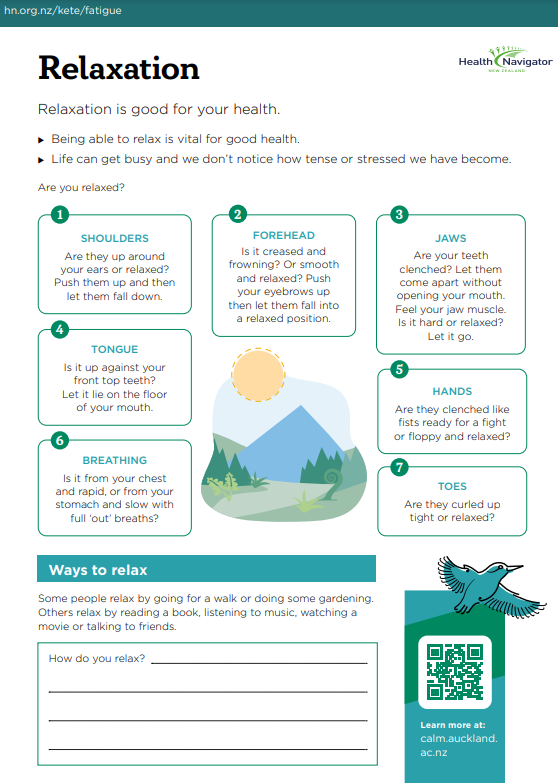
Healthify He Puna Waiora, NZ, 2022
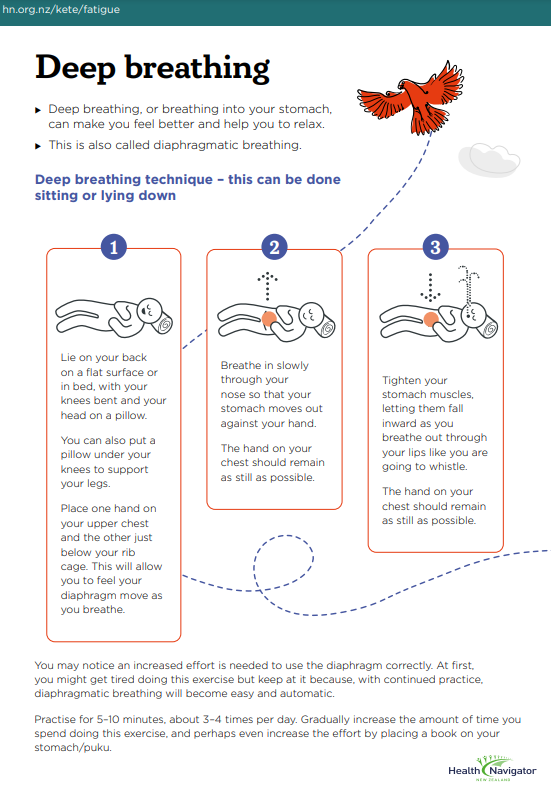
Healthify He Puna Waiora, NZ, 2022
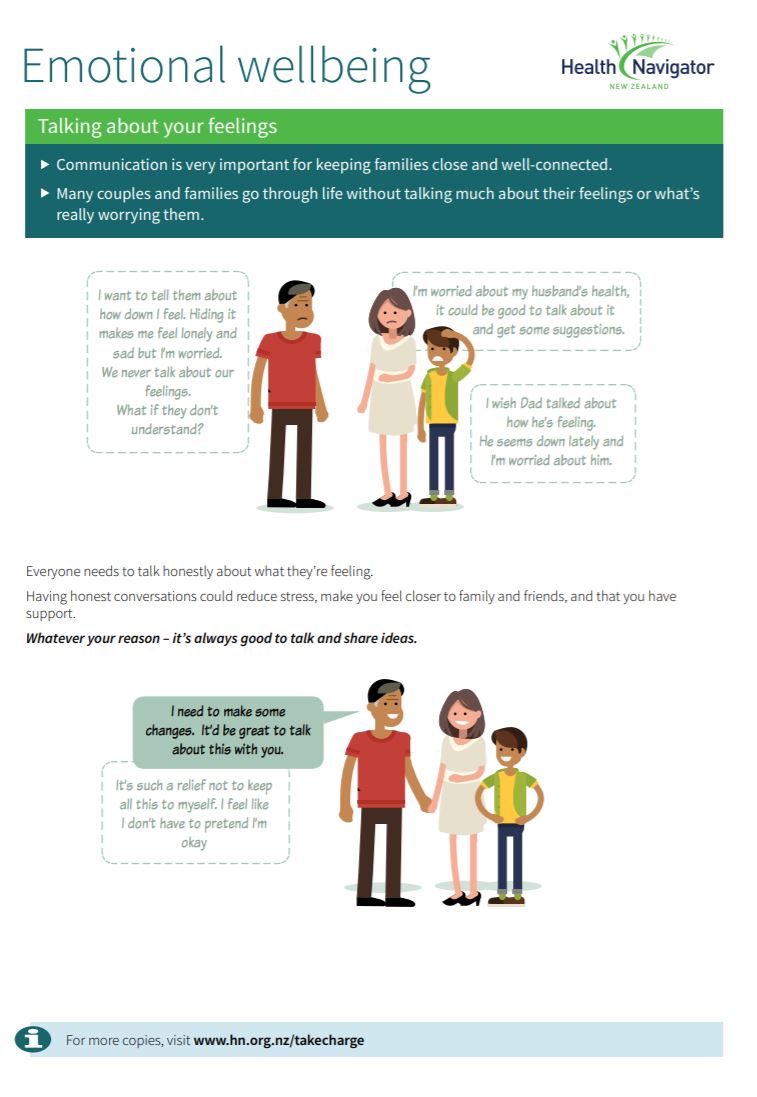
Healthify He Puna Waiora, NZ
Credits: Healthify Editorial Team. Healthify is brought to you by Health Navigator Charitable Trust.
Reviewed by: Kris Garstang, Clinical Psychologist, Life Mind Psychology
Last reviewed:
Page last updated:





